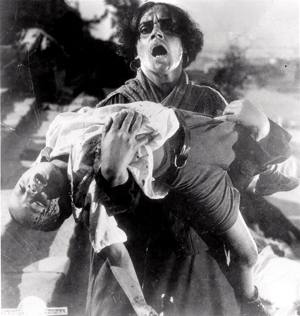
- Komite Internazionalistak has organised the Potemkin film cycle in Bilbao, where it offers the possibility of watching leftist and critical cinema in the room that was the first Pole of Conflict, on the last Sundays of the month. Author cinema is the main argument that the films that are projected will serve criticism and reflection.

The new film cycle is entitled The boat of the film by Serguei Eisenstein, held in 1925, together with Potemkin, with whom the film was born, which could serve as a propaganda instrument. It proved that film was not only useful for power, but also for the people, that it could be an instrument for revolution. Gontzal Martínez de la Hidalga, member of Komite Internazionalistak and Potemkin, responsible for the film cycle, have explained the details of this initiative. “We did not want to leave the Pole of Conflict as it is: this place is mythical in the Old Town of Bilbao and we want it to remain so. We do not want the room, which has had a special meaning for so many years, to become a regular store.”
Leaving aside the issue of the new headquarters, we have begun to talk about cinema. “We had long intended to use film as a critical tool. Power has always used it as an instrument for manipulating and disseminating his discourse, but there have also been movements in history that cinema has made to face this power. It has also been used to deal with the dominant discourse.” Martinez de la Hidalga has given examples of the different types of films that can be found today, “La nueva... They understand cinema as an instrument of reflection and criticism, especially considering that the movies we consume today, which are projected in the regular rooms, are made with the aim of entertaining and manipulating. Because in commercial cinema, values are also transmitted. Sometimes the messages are clear, but sometimes they are not hidden.”
It is therefore an alternative, left-wing and critical cinema. Watch the movie, then make a forum cinema and drink coffee or tea and cookies, in a relaxed and relaxed way. “We want it to be a nice place for debate,” explains Martínez de la Hidalga. The programming began in January with the film Z de Costa-Gravras on the Greek dictatorship in 1969. "It is absolutely valid to understand the situation in Greece and the fight against capitalism. However, we always try to ensure that the film offered has an artistic value, as there is cinema with good intention, but with little artistic value. And for us, it's important to have that too, because people have little chance of seeing these kinds of movies." Last month, the film The Battle of Algiers was screened. The work of Gillo Portecorvo shows Algeria’s struggle against French colonialism. “That also serves to understand the struggle that the Arab peoples are currently waging, as the European powers and the United States, as they were then, are using the same tools as imperialism.” In relation to the March 8 gathering, the film cycle Potemkin hosted the screening of the film German sisters of the filmmaker Margeritha von Trota. "So far, the films that have gone through Potemkin's screen have been award-winning, high-quality, publicly recognized films. On the part of the public we have also been well received, with an average of 50 attendees of all ages. Still, we hope that this amount will grow over time,” said Potemkin’s head.
“Cinematographic language is very useful for training and is an easily understandable language, with little effort, which makes it more attractive because of its capacity to generate emotions. We are accustomed to audio-visual languages and it seems that this is something we are asking for. In addition, it is a technically easy and cheap day.” In the coming months we will have the opportunity to see more quality films, always in original version. “We have tried to make the subtitles in Euskera, but it’s especially difficult for these films. However, we have sometimes obtained subtitles in Euskera and try to make Euskera the main language, both in films and in the cinema forum.”
On the last Sunday of April, Rome, the open city of Rossellini in 1945, on the occasion of the day against fascism held in Italy on 25 April. As explained by the member of Komite Internazionalistak, his intentions are also to work historical memory through films. The film Reds, by Warren Beatty, will be released on May 1. “Not only to remember the historical memory, but to update it, because the facts that have happened in history can serve to understand what we are today, just as what we do today will condition the future.”